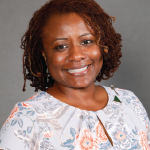
abstract / shutterstock.com
Over the past 16 months, the world has shone a bright light on the importance of diversity, equity and inclusion (DEI). Although the College has been focused on diversity initiatives since 2020, the interprofessional division of the College, the ARP, has recently taken a deeper dive into DEI initiatives in its processes, procedures and volunteering. Our goal is to dispel the notion that who you know can get you where you want to be, whether that’s a position on a committee or a special task force, or even as a member of the executive leadership.
Over the past three years, ARP staff, volunteers and executive leaders have worked together to bring DEI to the forefront and increase transparency in volunteering. We believe that everyone, no matter their discipline, background, network, orientation, race, religion, age or career stage, should have equal opportunities and a respected voice and seat at the table. As the ARP moves into the future, we want every member to see a place where they fit in the organization, so we can fulfill the College’s mission to “empower rheumatology professionals to excel in their specialty” through volunteering, networking and professional, personal and leadership development.
Why Should You Volunteer?
Being a volunteer allows you to be a part of a unique group of people who use their voices, insight and expertise to shape the future of rheumatology. Through volunteerism, you have the opportunity to work on current projects, such as developing online education with the eLearning Subcommittee, developing onboarding programs with the Practice Committee or selecting the slate of volunteers and merit awardees with the ARP Membership & Nominations Committee.
Volunteering also allows for leadership development. ARP members are encouraged to be leaders through service on various committees with the ACR, the ARP and the Rheumatology Research Foundation. As a volunteer, you can share your thoughts on various topics, question the process when things don’t make sense and encourage others to change the landscape of rheumatology.
As part of leadership development, volunteers are invited to attend annual leadership development conferences, where they can cultivate their leadership skills. Topics include team building, having difficult conversations, engaging members across generations and negotiating. You may also find a mentor or collaborators with similar interests.
Throughout your volunteer journey, you’ll find numerous opportunities for community building with rheumatology professionals from around the globe. Diversity, equity, inclusion and transparency are crucial to ensuring that various interests, professional perspectives and solutions to education, research and practice challenges are present.
DEI is a theme inherent to each benefit of volunteering, so to ensure each committee/group has representation from various member constituencies, the nominations committee collates aggregate data and evaluates the needs of each group while making placements. The committee exhausts every option to ensure members come from diverse backgrounds, geographic areas, career stages, practice settings and professional disciplines, as well as differ in personal characteristics.


